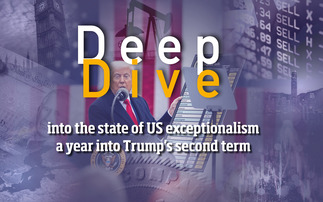The S&P 500 is poised for its fastest 100% recovery in history and investors remain bullish on the US equity market, but advise caution on the sustainability of such a rapid recovery.
Ritu Vohora, capital markets specialist at T. Rowe Price, pointed to chair of the Federal Reserve Jerome Powell's statement in March 2020 to use the US central bank's "full range of tools to support the US economy" until "substantial further progress" is made toward a full economic recovery.
"It is unquestioned that unprecedented quantitative easing and the massive fiscal response to the pandemic have supported and accentuated the rapid recovery in risk assets," she added.
US equity growth is no longer scarce
However, with tapering on the horizon, the trajectory of the recovery could well change, and co-manager of the BNY Mellon Sustainable Global Equity fund Yuko Takano, believes the US equity market has already priced in recovery and is "looking towards the next stage".
Elliot Hentov, head of policy and research at State Street Global Advisors, warns the upcoming policy changes bring several risks of their own which "could damage sentiment". "Notably, there is a risk of central bank miscommunication, which could lead to faster tightening than markets expect," he said.
"We have learned from previous QE rounds that the announcements have huge impact, sometimes even greater than the actual tapering, as markets readjust to future demand/supply."
He added that the "concentration of the rally in growth assets means sectoral regulatory or policy intervention could have an outsized effect on the overall market".
"I do not believe the 100% mark bears any technical significance. We are nearing equity highs that require additional new support so the previous record may not be broken so soon after all. Both from an economic and market perspective, we still need to reach escape velocity from the pandemic, and the outlook for that remains mixed although tilted slightly in bullish direction."
Economic cycles
Many in the industry have warned of the volatility all of these effects may have on equities, and George Lagarias, chief economist at Mazars, added that this is inherent to the economy cycle.
"Macroeconomic volatility is a feature of an early economic cycle," he said. "Looking at the circumstances during this one, for instance high inflation, high debt, significant supply constraints and a persisting pandemic, we feel that, if anything, this cycle could likely feature even more volatility than in the past.
"Whether this sort of volatility will permanently hurt the recovery may well depend on the levels of government fiscal support and global cooperation to end the pandemic."
While there is agreement a mid-cycle slowdown is due, there is disagreement as to when this may arrive.
Stonehage Fleming's Smit suggested "we may well already be in an early mid-cycle economic environment", while Chelsea Financial Services' Schooling Latter argues the market saw "a bit of one" earlier this year and will see another soon.
Co-manager of the OYSTER US Value fund Eric Lynch is less positive on the outlook, and argued the rate of economic recovery has already peaked and "we find ourselves mid-cycle".















